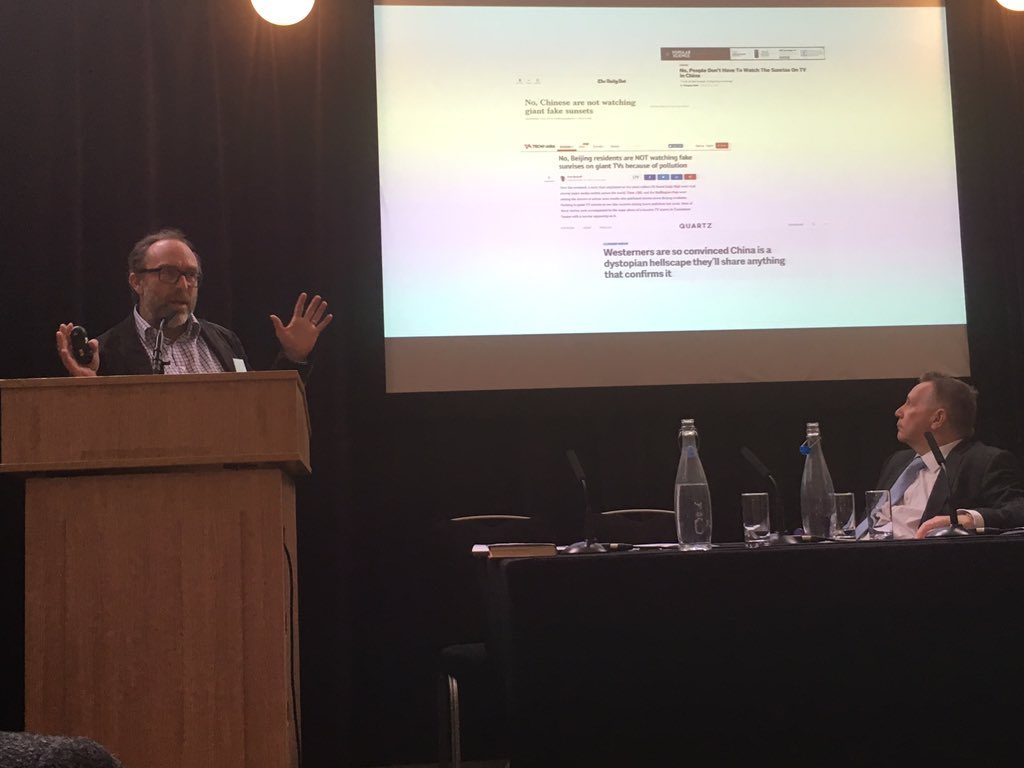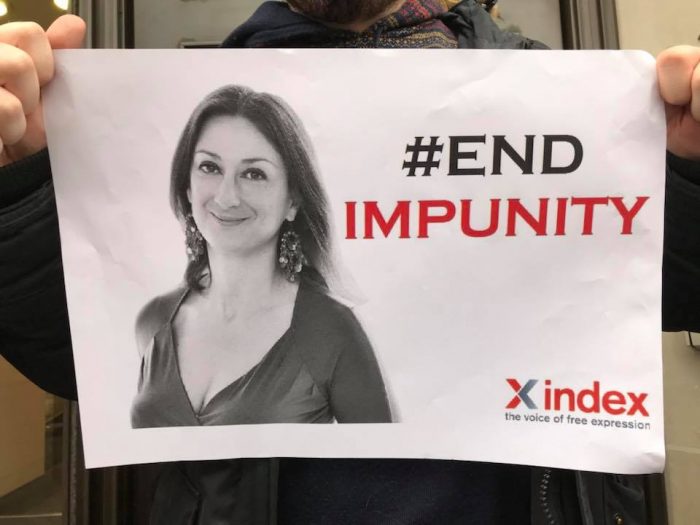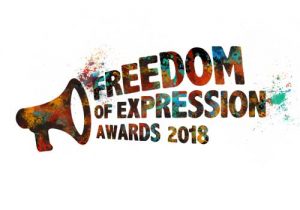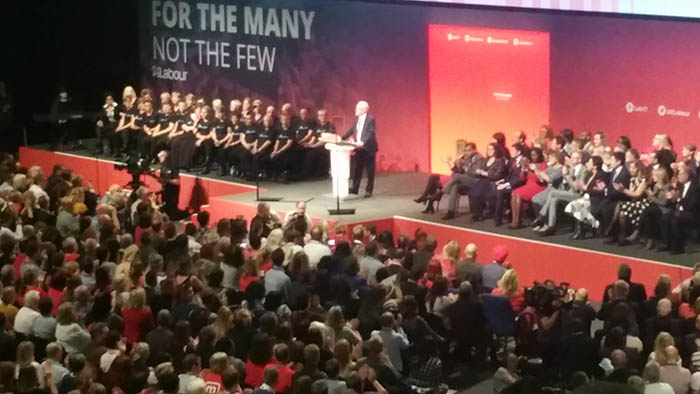27 Apr 2018 | Media Freedom, media freedom featured, News
[vc_row][vc_column][vc_column_text]

Wikipedia co-founder Jimmy Wales speaking at Westminster Media Forum, April 2018. Credit: Daniel Bruce
“The advertising-only business model has been incredibly destructive for journalism,” said Wikipedia co-founder Jimmy Wales at a Westminster Media Forum event on Thursday 26 April 2018 in London that looked at “fake news”.
“We need to resolve the incentives so that it makes sense and is financially sustainable to do good news,” Wales added.
Wales cited examples of false news stories that had been published on the Mail Online, such as an article featuring a projection of a perfect horizon in Beijing, erected as a way to compensate for the pollution, which proved fake, and a story claiming the Pope supported Donald Trump. He said the Daily Mail of 20 years ago was different. While not what he would choose to read, he thinks there is a place in the media landscape for tabloids, but one running fake news is “a quantum leap we should be very concerned about”.
Suggesting alternatives to advertising-only models, Wales said the Guardian’s donation request box (which he admitted he had consulted on) was an excellent example of how a media organisation can earn money without compromising standards. Meanwhile, a total paywall was very beneficial for some media, in particular financial media, with those readers valuing inside knowledge on the markets, though it would not suit all (the Guardian’s Snowden files, for example, were information he said he would want everyone to be able to access at the same time).
Wales’s concerns about the advertising-only, clickbait-style media models were echoed by others throughout the conference. Drawing an impressive panel of industry experts across media, law and tech, they all united in the view that while fake news meant a myriad of things to many different people, and was not something new, it was nevertheless problematic. Mark Borkowski, founder and head of Borkowski PR, spoke of the 19th-century great moon hoax and how “everything is different and everything is the same” before adding: “The speed at which we expect to get information, without proper fact-checking, is a plague.”
Nic Newman from the Reuters Institute for the Study of Journalism proposed different ways for media to gain more trust, of which “slowing down” was one. Richard Sambrook, former director of global news at the BBC and now director of the Centre for Journalism at Cardiff University, said the rise in the number of opinion pieces over evidenced-based journalism was because they were cheaper to commission.
Better education about what constitutes good quality, reliable media was another solution proposed.
“Audiences need better education and sensitivity around algorithms,” said Kathryn Geels, from Digital Catapult.
Katie Lloyd, who is development director at the BBC’s School Report and who runs workshops around the country educating school children into news literacy, said there was a sense of urgency and confusion when it came to the topic and that teachers feel like it really needs to be taught.
“Young people are on the one hand savvy and on the other not so much and need extra help,” said Lloyd, adding that of those children she had interacted with, most knew what fake news was in principle, but not how to spot it.
“When we started talking to teachers they said they didn’t have the tools and the skills to teach it,” she added, tapping into a point raised by head of home news and deputy head of newsgathering at Sky, Sarah Whitehead, who said media education was just as important for older people as it was for the young, as the world of online was not the domain of only one group.
Lloyd also explained that diversity was essential when it came to who was delivering news as people were more likely to trust news from those they could relate to. This was in response to an audience member saying they had spoken to school children who expressed that they respected news on Vice over the BBC. Lloyd agreed that it was essential for news organisations to have a wide range of people in terms of age and background. [/vc_column_text][/vc_column][/vc_row][vc_row][vc_column][vc_basic_grid post_type=”post” max_items=”4″ element_width=”6″ grid_id=”vc_gid:1524822984082-ad9d065c-d104-5″ taxonomies=”6564″][/vc_column][/vc_row]
16 Apr 2018 | Campaigns -- Featured, Media Freedom, media freedom featured, Statements
[vc_row][vc_column][vc_column_text]

Daphne Caruana Galizia, the Maltese investigative journalist who was assassinated in October 2017, had numerous lawsuits pending at the time of her murder.
Around the world, big business and corrupt politicians are using threats of legal action to silence journalists and other critics — including NGOs and activists.
Usually this starts with a letter threatening expensive proceedings unless online articles are rewritten or removed altogether, and demanding an agreement not to publish anything similar in the future. The letters often tell the recipient that they cannot even report the fact that they have received the letter.
This process is known as a SLAPP (Strategic Lawsuit Against Public Participation). SLAPPs are designed to intimidate and silence critics by burdening defendants with huge legal costs. The purpose of SLAPPs is not to win the case. They are vexatious and are designed to eat up time and resources. They are a way to harass and intimidate journalists and others and dissuade them from reporting.
SLAPP suits are a particular problem for independent media outlets and other small organisations. They are financially draining and can take years to process. Faced with the threat of a lengthy litigation battle and expensive legal fees, many who receive SLAPPs are simply forced into silence.
Don’t let them silence you
Index believes that by encouraging journalists and media outlets to talk more openly about these threats, we can begin to put an end to the use of these vexatious lawsuits that threaten democracy.
We support an initiative by members of the European Parliament for a new directive to tackle SLAPPs.
We also know that getting such changes takes time. But it can be done. In the United States, 34 states have enacted laws to combat SLAPPs. California, which adopted its anti-SLAPP legislation in 2009, enables defendants to sue the original plaintiff for malicious prosecution or abuse of process.
In 2015 Canada passed the Protection of Public Participation Act, which aimed to implement a fast-track review process to identify and end vexatious lawsuits.
In the meantime, there are some steps that all journalists can take to help put an end to this practice.
1. Know you are not alone
Journalists from Albania to Japan have received such letters. In Malta, for example, The Shift News website received a letter late last year from law firm Henley and Partners demanding an article be removed. Henley and Partners also stated that the letter was not to be made public.
Daphne Caruana Galizia, the Maltese investigative journalist who was assassinated in October 2017, had numerous lawsuits pending at the time of her murder. She was being sued by Pilatus Bank, a Maltese-based financial institution she frequently criticised. The lawsuit was filed in the USA and dropped following the killing.
Other Maltese media groups, faced with legal threats, have complied with Pilatus Bank’s requests, and deleted and amended articles in their online archives. Pilatus denies any wrongdoing.
In the UK, Appleby, the firm associated with the Paradise Papers, is threatening legal action against the Guardian and the BBC, demanding they disclose any of the six million Appleby documents that informed their reporting and seeking damages for the disclosure of what it says are confidential legal documents.
2. Tell others if you receive a letter
Speak to someone you trust. This could be a colleague at your place of work, your local union or a representative from a nonprofit organisation working in your country or region. Nonprofit organisations and others working in the field of journalist safety include:
Article 19
Committee to Protect Journalists
European Centre for Press and Media Freedom
European Federation of Journalists
International Press Institute
Index on Censorship
Reporters Without Borders
SEEMO
A major fear when receiving a SLAPP letter from a large law firm can be a sinking feeling that you might indeed have something wrong with your story. This casts a long shadow of self-doubt and can prevent journalists even from discussing the letters with each other within the same newsroom.
If you receive these legal threats, discuss them with journalists from other publications who are working on similar stories. This is often the only way to find out that the subject of your investigations is trying to shut down the public discussion systematically. “Discovering that pattern is not only a story in itself, but critically important in helping journalists work together to defend themselves,” says investigative reporter Matthew Caruana Galizia.
3. Report it
If you work in one of the countries covered by the project, you should report such threats to the Index on Censorship Mapping Media Freedom platform, which documents threats to media freedom. Index works with other organisations to raise the worst cases with the Council of Europe so that the council can raise cases directly with the governments concerned.
When you document these threats on Mapping Media Freedom, you help to show that they exist and are a problem for journalists and the public, who are robbed of their right to know. Once we have that documentary evidence, we can push harder for a change in legislation. We believe that the number of threats would speak for themselves, if everyone in the countries we cover reported them.
4. Know your rights
Get expert legal advice but remember that not all lawyers are the same. There are lawyers who are experienced in dealing with SLAPPs. For example, the European Centre for Press and Media Freedom has a legal team that can advise on SLAPP lawsuits and Doughty Street Chambers has an International Media Defence Panel who regularly assist journalists and NGOs faced with these kinds of threats.
Have you received a SLAPP letter? Let us know. Spreading the word about this cases is important in tackling the problem. The more we can document the extent of this issue, the easier it will be to address it. Please let us know by contacting Joy Hyvarinen, Head of Advocacy, at [email protected]. [/vc_column_text][/vc_column][/vc_row][vc_row][vc_column][vc_basic_grid post_type=”post” max_items=”12″ style=”load-more” items_per_page=”4″ element_width=”6″ grid_id=”vc_gid:1523875014232-cb75410f-355e-4″ taxonomies=”8996″][/vc_column][/vc_row]
8 Jan 2018 | Awards, News, Press Releases
[vc_row][vc_column][vc_column_text]

Index on Censorship Freedom of Expression Awards Fellowship 2018
Index on Censorship is proud to announce that long-time BBC reporter Razia Iqbal and CEO of the world famous Serpentine Galleries Yana Peel will join a panel of judges to decide the 2018 Freedom of Expression Awards Fellowship winners.
The Freedom of Expression Awards, now in their 18th year, honour champions of free expression and those battling censorship around the world in the field of arts, campaigning, digital activism and journalism. Many have faced prosecution and punishment for their work.
Peel sits on advisory boards for the Tate, the British Fashion Council and the Lincoln Center for the Performing Arts, and is a young global leader of the World Economic Forum. Currently CEO of the Serpentine Galleries, she previously ran Intelligence Squared Group, a leading forum for live debate, and was a regular contributor to the Davos annual meeting and the DLD, particularly on topics at the intersection of technology and visual art.
Iqbal has been an arts correspondent for the BBC for over a decade and is one of the main presenters of Newshour, the flagship news and current affairs programme on BBC World Service radio, and regularly presents The World Tonight on BBC Radio 4.
Iqbal says “In my lifetime, there has never been a more critical time to fight for freedom of expression. Whether it is in countries where people are imprisoned or worse, killed, for saying things the state or others, don’t want to hear, it continues to be fought for and demanded. It is a privilege to be associated with the Index on Censorship judging panel.”
The judging panel will also include Raspberry Pi Ltd CEO Eben Upton, founder of the Raspberry Pi Foundation, a UK-based charity that advances computer science education in schools, who was recently elected to the fellowship of the Royal Academy of Engineering in 2017; and Tim Moloney QC, deputy head of Doughty Street Chambers and Band 1 of Crime Silks, classed as leading silk in the current Legal 500.
Announcing the judging panel, Index on Censorship chief executive Jodie Ginsberg said:“Freedom of expression is a right that our award winners and nominees work tirelessly to defend. The awards draw attention to the repression that they face every day and give us a chance to celebrate and support these inspiring journalists, activists, and artists.
“We’re excited to announce this year’s remarkable panel of judges, who are leaders and experts in their fields. The Freedom of Expression Awards Fellowship recognise global free speech heroes and provide assistance so that their important work can continue.”
Previous winners of the Freedom of Expression Awards include Nobel Peace Prize winner Pakistani education campaigner Malala Yousafzai, Chinese political cartoonist Rebel Pepper and Yemeni street artist Murad Subay. Hundreds of public nominations are made for the awards each year. Many of those nominated are regularly targeted by authorities or by criminal and extremist groups for their work. Some face regular death threats, others criminal prosecution.
Previous judges include digital campaigner and entrepreneur Martha Lane Fox, Nobel laureate Wole Soyinka, Harry Potter actor Noma Dumezweni, novelist Elif Shafak, award-winning journalist and former editor-in-chief of Vanity Fair and The New Yorker Tina Brown and human rights lawyer and shadow Brexit secretary Keir Starmer.
The Freedom of Expression Awards Fellowship ceremony 2018 will be held on April 19 in London.
For Index on Censorship
Sean Gallagher, [email protected]
About the Freedom of Expression Awards Fellowship
Winners of the 2018 Freedom of Expression Awards Fellowship receive 12 months of capacity building, coaching and strategic support. Through the fellowships, Index seeks to maximise the impact and sustainability of voices at the forefront of pushing back censorship worldwide. More information
About Index on Censorship
Index on Censorship is a London-based non-profit organisation that publishes work by censored writers and artists and campaigns against censorship worldwide. Since its founding in 1972, Index on Censorship has published some of the greatest names in literature in its award-winning quarterly magazine, including Samuel Beckett, Nadine Gordimer, Mario Vargas Llosa, Arthur Miller and Kurt Vonnegut. It also has published some of the world’s best campaigning writers from Vaclav Havel to Elif Shafak.[/vc_column_text][/vc_column][/vc_row][vc_row][vc_column][vc_row_inner][vc_column_inner width=”1/2″][staff name=”Razia Iqbal, Journalist” profile_image=”97201″]Razia Iqbal is a presenter for BBC News: she is one of the main presenters of Newshour, the flagship news and current affairs programme on BBC World Service radio. She also regularly presents The World Tonight on BBC Radio 4, a British weekday current affairs radio programme broadcast. Iqbal has hosted HARDtalk Extra, a BBC television and radio programme that conducts in depth one-on-one interviews with significant artists such as Pakistani pop star Haroon and prolific American writer, Joyce Carol Oates. She was the BBC’s arts correspondent for a decade, and has worked as a political reporter and a foreign correspondent in Pakistan and Sri Lanka. Iqbal has also made several successful documentaries through the BBC and presented on a variety of programmes. She was born in Kampala, Uganda and came to London as a child. Iqbal graduated with a BA in American Studies from the University of East Anglia and was nominated in 2013 for the “Services to Media” award at the British Muslims Awards. [/staff][/vc_column_inner][vc_column_inner width=”1/2″][staff name=”Tim Moloney QC, Barrister” profile_image=”97202″]Tim Moloney QC is the deputy head of Doughty Street Chambers. His practice encompasses crime, extradition, international criminal law, international death penalty litigation, public law and media law. Moloney consistently acts in high profile litigation across the spectrum of his practice. He also advises high profile organisations on their exposure to involvement with acts of terrorism and is regularly involved in training of lawyers overseas in the law and practice relating to terrorism and the death penalty. He also regularly advises media organisations on issues they face relating to terrorism and disclosure. Following the completion of his Ph.D, Moloney was a lecturer in law before being called to the Bar in 1993. He became a QC in 2010. He continues to write and lecture extensively. He is the author of the sexual offences, terrorism and appeals sections of the leading reference work, Blackstone’s Criminal Practice, and is the author of the sentencing chapters in Rook and Ward on Sexual Offences. Moloney is also a member of the panel of experts for Halsbury’s Laws.[/staff][/vc_column_inner][/vc_row_inner][/vc_column][/vc_row][vc_row][vc_column width=”1/2″][staff name=”Yana Peel, Chief Executive” profile_image=”97203″]Yana Peel is CEO of the Serpentine Galleries, London, one of the most recognised organisations in the global contemporary art, design and architecture worlds. Prior to this she ran Intelligence Squared Group, the leading forum for live debate. Having co-founded Outset Contemporary Art Fund in 2003 as a hub for creative funding solutions for cultural projects, Peel maintains advisory positions across the arts that include: Tate, British Fashion Council, V-A-C Foundation Moscow, Lincoln Center and Asia Art Archive. At ParaSite Art Space and Intelligence Squared, she serves as board co-chair. Peel is a young global leader of the World Economic Forum and a regular contributor to the Davos annual meeting and DLD, particularly on topics at the intersection of technology and visual art. Her two children provide inspiration for her best-selling book series, Art for Baby, which benefits the National Society for the Protection against Cruelty to Children (NSPCC). Peel was born in St Petersburg, Russia, attended McGill University, completed her post-graduate studies in Economics at LSE, and started her career at Goldman Sachs.[/staff][/vc_column][vc_column width=”1/2″][staff name=”Eben Upton CBE, Chief Executive” profile_image=”97204″]Eben Upton CBE is a founder of the Raspberry Pi Foundation and serves as the CEO of Raspberry Pi Ltd, its commercial and engineering subsidiary. He is the co-author, with Gareth Halfacree of the Raspberry Pi User Guide, and with Jeff Duntemann and others of Learning Computer Architecture with Raspberry Pi. He was elected to the Fellowship of the Royal Academy of Engineering in 2017. In an earlier life, he founded two successful mobile games and middleware companies, Ideaworks 3d and Podfun, held the post of director of studies for Computer Science at St John’s College, Cambridge, and wrote the Oxford Rhyming Dictionary with his father, Professor Clive Upton. He holds a BA in Physics and Engineering, a PhD in Computer Science, and an MBA, from the University of Cambridge.[/staff][/vc_column][/vc_row][vc_row][vc_column][vc_separator][/vc_column][/vc_row][vc_row full_width=”stretch_row_content” equal_height=”yes” css=”.vc_custom_1515150485442{background-color: #cb3000 !important;}” el_class=”text_white”][vc_column width=”1/2″][vc_custom_heading text=”Support the Index Fellowship” font_container=”tag:h2|text_align:center” use_theme_fonts=”yes” link=”url:https%3A%2F%2Fwww.indexoncensorship.org%2Fsupport-the-freedom-of-expression-awards%2F|||”][vc_column_text]
By donating to the Freedom of Expression Awards you help us support individuals and groups at the forefront of tackling censorship.
[/vc_column_text][/vc_column][vc_column width=”1/2″ css=”.vc_custom_1515150288338{background-image: url(https://www.indexoncensorship.org/wp-content/uploads/2017/04/2017-awards-fellows-1460×490-2.jpg?id=89631) !important;background-position: center !important;background-repeat: no-repeat !important;background-size: cover !important;}”][/vc_column][/vc_row][vc_row][vc_column][vc_separator][/vc_column][/vc_row][vc_row][vc_column][vc_custom_heading text=”Don’t lose your voice. Stay informed.” font_container=”tag:h3|text_align:left” use_theme_fonts=”yes”][vc_row_inner][vc_column_inner width=”1/2″][vc_column_text]Index on Censorship is a nonprofit that campaigns for and defends free expression worldwide. We publish work by censored writers and artists, promote debate, and monitor threats to free speech. We believe that everyone should be free to express themselves without fear of harm or persecution – no matter what their views.
Join our mailing list (or follow us on Twitter or Facebook) and we’ll send you our weekly newsletter about our activities defending free speech. We won’t share your personal information with anyone outside Index.[/vc_column_text][/vc_column_inner][vc_column_inner width=”1/2″][gravityform id=”20″ title=”false” description=”false” ajax=”false”][/vc_column_inner][/vc_row_inner][/vc_column][/vc_row]
4 Oct 2017 | Mapping Media Freedom, Media Freedom, media freedom featured, News
[vc_row][vc_column][vc_column_text]

Jeremy Corbyn speaks at Labour Party conference in Brighton, September 2017. Credit: DaveLevy/Flickr
During his first speech at conference as Labour Party leader in September 2015, Jeremy Corbyn called for an end to “personal abuse” and urged delegates to “treat people with respect”.
“Cut out the cyber-bullying and especially the misogynistic abuse online,” he added. “I want kinder politics.”
Two years on the message hasn’t gotten through.
On 24 September 2017, the second day of this year’s party conference, BBC political editor Laura Kuenssberg was assigned bodyguards after receiving abusive threats online.
The BBC had also decided to bolster Kuenssberg’s personal protection during the general election in June after she faced threats over alleged bias in her reporting surrounding Labour leader Jeremy Corbyn. She has also been accused of partiality by Conservative and Ukip supporters.
“It is unprecedented that a journalist would need protection to do her job covering a political conference in the UK, which makes this all the more troubling,” Hannah Machlin, project manager for Index on Censorship’s’ Mapping Media Freedom project, said. “Laura’s case indicates that sexist online abuse against women journalists has become part of the job, and it’s affecting not only the safety of reporters but also a functioning free press.”
Two other journalists were refused entry altogether to the conference. On 23 September, Sussex police refused to give Huck magazine editor Michael Segalov a press security clearance required to attend. Segalov wrote that he applied for press accreditation three months prior to the conference but was informed the evening of 19 September that it had been denied based on the police’s refusal to grant him security clearance.
“Rather than provide reasons and rationale for our journalistic freedom being curtailed, the police said they would not divulge why they made their call,” Segalov wrote. He has never been arrested, charged or convicted of any crime.
“This might be a single incident, but the repercussions should it go unchallenged are worrying. The police restricting the rights of a journalist from attending a political event without giving any rationale, basis or reason puts our civil liberties on the line.”
On 24 September, Michael Walker, a left-wing journalist working for Novara Media, was also barred from entering by police.
“Barring reporters is a form of censorship,” Machlin added. “Political parties interfering with access to events undermines key parts of democracy and sends a clear message from the labour party to all other journalists.”
Earlier this year, Corbyn’s press team barred Buzzed from campaign events. On 9 May, in the run-up to the general election, a senior Corbyn aide told BuzzFeed News political editor Jim Waterson that his access was limited and that the website’s access to the Labour leader would be limited for the rest of the campaign. This was because of an interview with Corbyn published on 8 May had “disrupted media coverage of Labour’s launch event”, the website reported.
Buzzfeed published a piece quoting Corbyn that he remain as the party’s leader even if he lost the election. Corbyn told the BBC he had only said he would stay in power because they would win. BuzzFeed then published an extract of the interview, which showed they had quoted him accurately.
Waterson later regained access to the leader.
Such violations to media freedom are not limited to the Labour Party, however. Also in the run-up to the election, three journalists for Cornwall Live were shut in a room, prevented from filming and severely limited on what questions they could ask during Conservative prime minister Theresa May’s visit to a factory in Cornwall.
A reporter from Cornwell Live who was live-blogging the event wrote: “We’ve been told by the PM’s press team that we were not allowed to stand outside to see Theresa May arrive.”
On two occasions in April 2017, Conservative-run Thurrock Council in Essex said they would restrict access to journalists who “do not reflect the council’s position accurately”.
In the wake of the Grenfell Tower fire in June, the Kensington and Chelsea Council, which has been Conservative-run since 1964, tried to prevent journalists from attending its first after the atrocity. The council had sought to exclude the public and media from the cabinet meeting, arguing their presence would risk disorder. But after a legal challenge from five media organisations, a high court judge ordered the council to allow accredited journalists to attend half an hour before the meeting was due to start. [/vc_column_text][/vc_column][/vc_row][vc_row][vc_column][vc_basic_grid post_type=”post” max_items=”4″ element_width=”6″ grid_id=”vc_gid:1507044011187-4d3c340a-bdf9-4″ taxonomies=”6564″][/vc_column][/vc_row]




